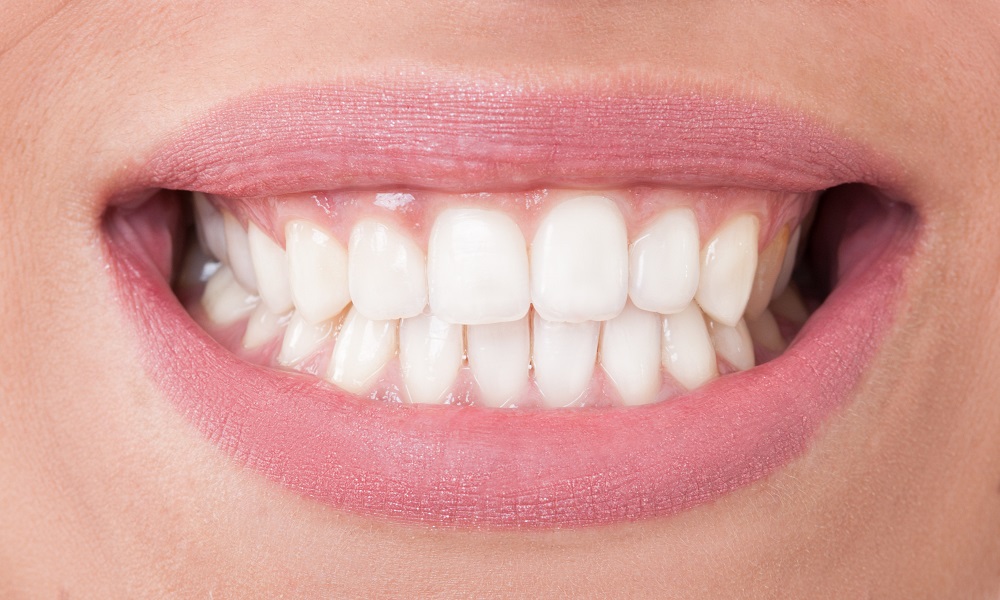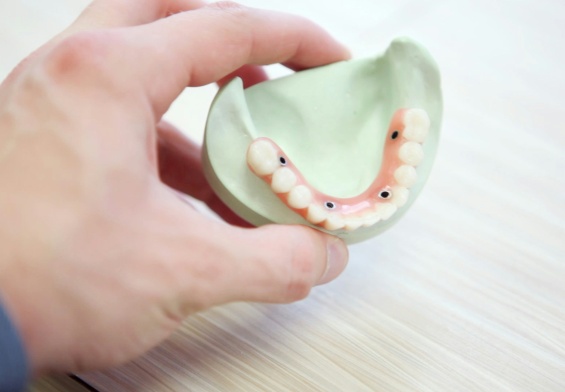Full mouth rehabilitation synthesizes elements of restorative and cosmetic dentistry to rebuild damaged smiles from the ground up. Also sometimes called full mouth restoration or dental reconstruction, it restores function, comfort, and aesthetics. While it revitalizes a patient’s confidence, it’s also one of the most complex and time-intensive dental procedures.
As such, it comes with its own array of pros and cons. Understanding the advantages and potential disadvantages helps patients make informed decisions and select the right full mouth restoration dentist in Millburn, NJ for their treatment.
Quick Answer: What Are the Drawbacks of Full Mouth Rehabilitation?
Full mouth rehabilitation can be:
- Costly, with limited insurance coverage
- Time-intensive, often taking several months
- Medically complex, carrying risks like infection or implant failure
- Disruptive, requiring temporary lifestyle adjustments
Working with the best full mouth restoration dentist in Millburn, NJ reduces these challenges and improves long-term outcomes.
What Full Mouth Rehabilitation Actually Involves
Dentists design full mouth rehabilitation for patients suffering from rampant tooth wear, decay, or loss. Usually, it blends cosmetic and restorative modalities like crowns, veneers, bridges, implants, and sometimes dentures.
According to the Cleveland Clinic, restorative procedures improve chewing ability and prevent future dental problems. But, full mouth cases need careful coordination and many phases. Each patient’s plan is unique, rebuilding the mouth’s structure and balance. To better understand the specific steps involved, see our guide on what full mouth rehabilitation includes.
How Does Full Mouth Rehabilitation Compare to Individual Dental Procedures?
Patients often wonder whether a single implant, crown, or veneer could achieve the same results. The differentiator here lies in scope and coordination.
Individual procedures address isolated issues, like a single damaged tooth. Full mouth rehabilitation treats the entire bite system. According to the Cleveland Clinic, this holistic approach improves alignment, stability, and facial balance that piecemeal treatments can’t always achieve.
For example, replacing one tooth may restore appearance. But, if worn or misaligned neighboring teeth are present, they can still reduce long-term function. Full mouth restoration verifies harmony between every component—implants, crowns, and bite forces.
Choosing the best full mouth restoration dentist in Millburn, NJ corroborates the precision and longevity of these elements. That lets them provide better comfort and predictability than a series of uncoordinated procedures. Learn more about who qualifies for restorative dentistry in New Jersey and how it differs from cosmetic options.
Why Choosing the Right Full Mouth Restoration Dentist in Millburn, NJ Matters
Full mouth rehabilitation is about rebuilding confidence, bite alignment, and long-term stability. A qualified full mouth restoration dentist in Millburn, NJ will reduce complications and guarantee comfort with a personalized, cutting-edge perspective.
Doing so requires combining digital technology and personalized planning for lasting results. Local specialists often integrate 3D imaging, digital design, and guided implant placement to deliver precision and efficiency. For Millburn patients balancing demanding schedules, this level of expertise is key to achieving predictable outcomes with minimal disruption.
How Much Does Full Mouth Rehabilitation Cost—and Why?
The largest disadvantage for most patients is cost. Full mouth rehabilitation involves premium materials and many stages of treatment. Expenses depend on the number of implants, crowns, and restorations required.
The American Dental Association notes that implant-supported restorations are among the most costly procedures. The surgical time and laboratory precision required fuel rising costs. Treatment often reaches tens of thousands of dollars, especially when restoring both arches.
For Millburn residents, some dental practices help offset costs with phased treatment plans or financing options. Still, most insurance plans limit coverage to basic restorative procedures. Upgrades from a cosmetic dentist in Clark, NJ, for example, are usually excluded.
Common Cost Factors
- Surgical and restorative work (implants, bridges, crowns)
- Cosmetic enhancements (veneers, gum contouring, whitening)
- Extra services (scans, anesthesia, post-op visits)
While expensive, full mouth rehabilitation is a long-term investment in oral health that prevents future decay, shifting, and bone loss.
How Long Does Full Mouth Rehabilitation Take?
Because it involves many procedures, full mouth rehabilitation takes time. The process usually spans six months to a year and includes several phases.
Those stages need to be done in sequence for patients to heal properly. Dental implant integration alone can take several months as the jawbone bonds with the titanium post.
For busy professionals in Millburn, the time commitment can be challenging. Yet, modern dental practices now use digital workflows that shorten appointments and improve precision. A 2025 study in Healthcare found that full-mouth digital rehabilitation under anesthesia reduced total treatment time while maintaining high accuracy in patients with cancer.
| Stage | Focus | Estimated Duration |
| Evaluation & Planning | Imaging, impressions, diagnostic design | 2–3 visits |
| Surgical Phase | Implant placement or extractions | Several weeks |
| Healing & Integration | Bone and tissue recovery | 3–6 months |
| Final Restoration | Crowns, veneers, or bridges | 1–2 months |
Working with a full mouth restoration dentist in Millburn, NJ who uses digital planning ensures efficiency and precision at each stage.
What Complications Can Happen During Full Mouth Rehabilitation?
Even when performed expertly, full mouth rehabilitation carries some risk. Biological and mechanical complications can occur, particularly in complex implant cases.
A 2020 study in the International Journal of Environmental Research and Public Health tracked 80 full-arch restorations over five years. Biological complications—mostly gum inflammation—occurred in 81.3% of restorations, while peri-implantitis affected 13.8%. Mechanical issues like porcelain chipping or screw loosening appeared in 38–48% of cases. But, those incidences were usually minor and easy to repair.
Proper hygiene, routine maintenance, and early intervention reduce these risks. For related insights, read about the common risks of cosmetic dentistry, especially for patients considering aesthetic enhancements.
| Category | Examples | Typical Resolution |
| Biological | Mucositis, peri-implantitis | Professional cleanings, antibacterial therapy |
| Mechanical | Porcelain fracture, screw loosening | Retorque, polish, or replacement |
| Surgical | Nerve or sinus irritation | Guided surgery and pre-op imaging |
| Healing-related | Swelling, delayed integration | Short-term medication and follow-up visits |
Most issues are preventable when patients maintain excellent hygiene and keep regular dental checkups.
Are There Surgical or Nerve Risks to Worry About?
Implant surgery, a key component of many full mouth restorations, involves working near sensitive structures such as nerves and sinuses.According to the Mayo Clinic, potential complications include temporary numbness, infection, or sinus inflammation.
These risks are rare when digital imaging guides these treatments. Millburn dentists usually use cone-beam CT (CBCT) scans and computer-assisted placement to plan precise implant angles and depths. This approach reduces surgical trauma and recovery time. For a deeper look at post-surgical recovery and patient expectations, explore what no one tells you about dental implants in NJ.
Patients with underlying medical conditions should discuss them before surgery. A customized approach clinches safer outcomes and faster healing.
How Full Mouth Restoration Affects Daily Life and Recovery
The recovery period can impact daily routines. Patients may need to follow a soft-food diet, avoid strenuous activity, and attend many adjustment visits. Some experience temporary speech changes or sensitivity during healing.
The process can also take an emotional toll. Temporary restorations and aesthetic transitions may diminish self-confidence until the final results are complete. But, studies show that satisfaction rates skyrocket after completion.
Millburn patients enjoy working with a local practice that puts their comfort and communication first. Regular updates, progress photos, and post-op care plans help patients stay confident.
Will Insurance Cover Full Mouth Rehabilitation Costs?
Insurance rarely covers the full cost of comprehensive rehabilitation. Most plans cap annual benefits between $1,000 and $2,000 and reimburse only the least expensive alternative treatment.
That means if a patient chooses implants over bridges, the plan may cover only what the bridges would cost. According to the National Association of Dental Plans, cosmetic services are generally excluded, even if functionally beneficial.
In Millburn, many dental practices help patients maximize benefits by dividing care across many benefit periods. Some offer in-house membership programs or partner with financing providers to make treatment more affordable.
Before starting, it’s best to review your policy and confirm which procedures qualify as restorative rather than cosmetic.
What Are the Long-Term Maintenance Requirements for Full Mouth Rehabilitation?
Even the most durable restorations need ongoing care. According to the U.S. Food and Drug Administration, consistent oral hygiene and professional cleanings are essential to preserve implant health and prevent peri-implantitis.
Patients should brush twice daily with non-abrasive toothpaste, floss using interdental tools, and schedule maintenance visits every six months. Millburn dentists often recommend night guards for patients who clench or grind their teeth.
Diet also plays a role. Limiting hard foods and acidic beverages reduces stress on ceramic restorations. Most importantly, follow-up imaging allows early detection of wear or bone changes around implants.
With proper care and professional oversight, full mouth restorations can last decades, often outperforming natural dentition in durability and comfort.
Modern Advances That Reduce the Risks and Recovery Time
While the disadvantages are real, modern dentistry has evolved to cut them.
- Digital Planning: 3D imaging and CAD/CAM design allow for precise implant placement and natural-looking restorations. These technologies reduce errors, shorten appointments, and enhance comfort.
- Advanced Materials: High-strength ceramics like zirconia resist chipping and wear. Titanium and biocompatible coatings promote faster healing and integration.
- Minimally Invasive Surgery: Guided implant techniques reduce incision size, swelling, and discomfort. Some patients even qualify for same-day temporary restorations.
- Comprehensive Aftercare: According to the U.S. Food and Drug Administration, regular professional maintenance and good home hygiene extend the lifespan of implants.
Success Checklist
- Choose a board-certified dentist with proven full-mouth experience.
- Confirm use of 3D imaging and digital workflows.
- Commit to excellent hygiene and follow-up visits.
- Stop smoking before surgery to promote healing.
An experienced full mouth restoration dentist in Millburn, NJ combines these innovations to deliver long-lasting, predictable results. Patients considering a cosmetic transformation may also be interested in learning what a smile makeover involves and how it complements full mouth restoration.
Key Takeaways for Millburn Patients Considering Full Mouth Rehabilitation
- Full mouth rehabilitation can restore oral function and aesthetics but requires time, patience, and financial investment.
- Common challenges include cost, insurance gaps, lengthy treatment, and occasional biological or mechanical complications.
- Modern technologies, like digital planning and guided surgery, reduce risks and shorten recovery.
- Consistent maintenance and communication with your dentist ensure lasting success.
- Choosing an expert full mouth restoration dentist in Millburn, NJ is the most effective way to manage these challenges and achieve excellent results.
Is Full Mouth Rehabilitation Worth It?
Full mouth rehabilitation is a life-changing investment, offering dramatic improvements in comfort, appearance, and confidence. Yet it requires commitment, planning, and expert care.
Studies in the International Journal of Environmental Research and Public Health show that with proper maintenance, implant and prosthesis survival rates exceed 98%—a strong indicator of long-term success.
For Millburn patients seeking a confident, functional smile, partnering with the best full mouth restoration dentist in Millburn, NJ brings advanced technology, customized care, and reliable outcomes.
To explore your treatment options, visit Garden State Dental Design’s Full Mouth Rehabilitation page and start your journey toward a healthier, stronger smile.
Resources:
Batisse, C.; El Osta, N.; Cousson, P.-Y. Full-Mouth Digital Dental Rehabilitation Under General Anesthesia in a Post-Treatment Intraoral Squamous Cell Carcinoma Patient: A Case Report. Healthcare 2025, 13, 940. https://doi.org/ 10.3390/healthcare13080940
Chidambaranathan AS, Tah R, Balasubramanium MK. Full mouth rehabilitation with fixed teeth supported prosthesis following hobo twin stage technique – A case Report. J Biol Methods. 2024;11(4):e99010027. DOI: 10.14440/jbm.2024.0036
Cleveland Clinic – Restorative Dentistry
Gonzalez-Gonzalez I, deLlanos-Lanchares H, Brizuela-Velasco A, et al. Complications of Fixed Full-Arch Implant-Supported Metal-Ceramic Prostheses. Int J Environ Res Public Health. 2020;17(12):4250. Published 2020 Jun 14. doi:10.3390/ijerph17124250
Mayo Clinic – Dental Implant Surgery




